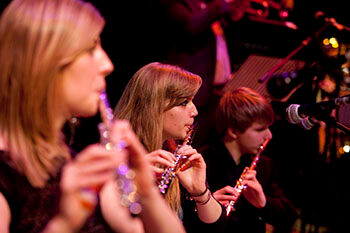University News Last updated 29 October 2018

A new report from Birmingham City University has found that a record number of people are learning musical instruments thanks to music hubs, but has also revealed gender differences and under-representation of children with special educational needs in music.
The report, led by Professor Martin Fautley and released by Arts Council England, found that children with special educational needs and disabilities (SEND) were under-represented in musical activities, making up just 5.4 per cent of pupils participating in area-based ensembles and choirs, but making up 14.4 per cent of the pupil population nationally.
In contrast, the findings suggest that girls were over-represented across musical activities, representing as much as 60 per cent of ensemble attendance, but only 48.9 per cent of the school population.
Music hubs aim to ensure that all children aged five to 18 have the chance to learn a musical instrument with clear progression routes and opportunities to perform. The hubs are made up of local authorities, schools and community organisations who work in partnership to offer these opportunities.
Martin Fautley, Professor of Education, Birmingham City University, said: “These findings present a mixed landscape for music education. It is fantastic to see that more people than ever are learning musical instruments, but with concerns about number of both advanced learners, and of SEND pupils, there is still work to be done.
The research focused on music provision in English schools during the 2016/17 academic year. It was carried out by the institution’s Birmingham Music Education Research Group (B-MERG) on behalf of Arts Council England, the organisation which runs music hubs across England, backed by £300 million government funding.
Research conducted by Professor Fautley last year showed that more children than ever are learning to play music, but few are advancing beyond ‘beginner’ level.